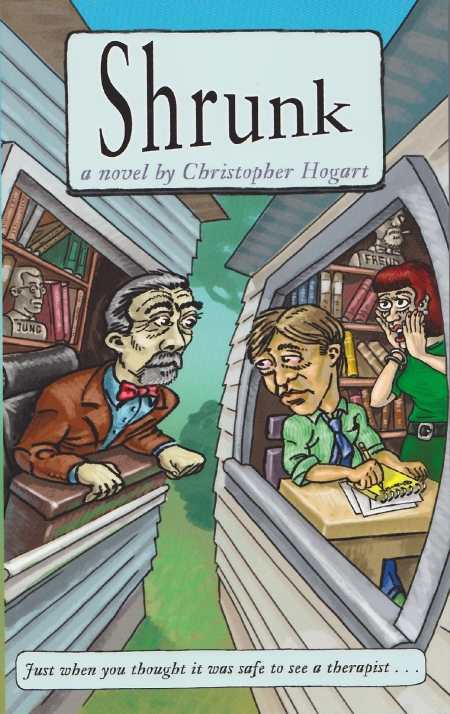Shrunk
The term “small-minded” describes individuals who behave in a self-serving, inflexible way that is detrimental to others. Many of the psychiatrists in Christopher Hogart’s satirical novel, Shrunk, have minds that have diminished beyond narrow.
Henry Avalon, a rising star in the psychiatric field, and his wife, Helena, make the mistake of moving next door to Albert Prendergast, an older, established therapist in Cambridge, Massachusetts, who feels threatened by his new neighbors. Albert’s campaign of pettiness begins with midnight shrieks and lawn vandalism and escalates into a brouhaha over zoning permits, ultimately wreaking havoc with Avalon’s marriage and career.
Hogart, a psychiatrist himself, deftly exposes the foibles of his profession using larger-than-life characterization and biting humor. While slighted passive-aggressive people go to great lengths to annoy others, they rarely go to the extremes Albert does. One has to chuckle when he adds an illegal addition to his house while the Avalons are on vacation, or when he asks to be Henry’s patient.
Henry’s colleague, Mendelson, plots how to legitimize his so-called discovery of Affect Deficiency Syndrome (ADS). In fact, ADS represents the common inability to express emotions that everyone experiences occasionally. Mendelson’s attempts to pathologize normal behavior via pompous speeches and articles will make readers chuckle.
There exists disturbing humor in the characters themselves. While few people know individuals as disturbed as Albert, everyone knows someone who blames mishaps on others. Albert is chillingly believable when he demands to know how Helena can “live with that nut,” referring to her husband, implying that Henry is the one causing problems instead of taking responsibility for his own actions. Similarly, anyone familiar with the controversy about the realness of ADHD or Asperger syndrome will see the humor and the critique of psychiatry in Mendelson’s ADS.
While he excels at characterization, critique, and humor, Hogart stumbles slightly when it comes to the details of his setting. Instead of a home security system with many cameras and microphones triggered by movement or noise, the Avalons use only one video camera to gather evidence against Albert, which they continually neglect to turn on. Their eccentric neighbor ends up filming Albert with his hodgepodge of A/V equipment. Most unbelievable of all, characters rarely use cell phones or email, preferring instead to use landlines and letters. In today’s technology-saturated world, it seems odd that at least Henry doesn’t use more cutting-edge communication devices.
As far as pacing, the amount of time that passes in the story between the asterisks that denote section breaks can range from a few hours to several weeks. Asterisks can also indicate a shift in viewpoint. Sometimes there will be a scene from a minor character’s point of view, someone who is absent for such long stretches of the book that readers may forget who such bit players are. Readers must be prepared for anything when they see Hogarth’s asterisks.
These issues aside, anyone seeking broad humor and an expansive satire of psychiatry should read Shrunk.
Reviewed by
Jill Allen
Disclosure: This article is not an endorsement, but a review. The publisher of this book provided free copies of the book and paid a small fee to have their book reviewed by a professional reviewer. Foreword Reviews and Clarion Reviews make no guarantee that the publisher will receive a positive review. Foreword Magazine, Inc. is disclosing this in accordance with the Federal Trade Commission’s 16 CFR, Part 255.

